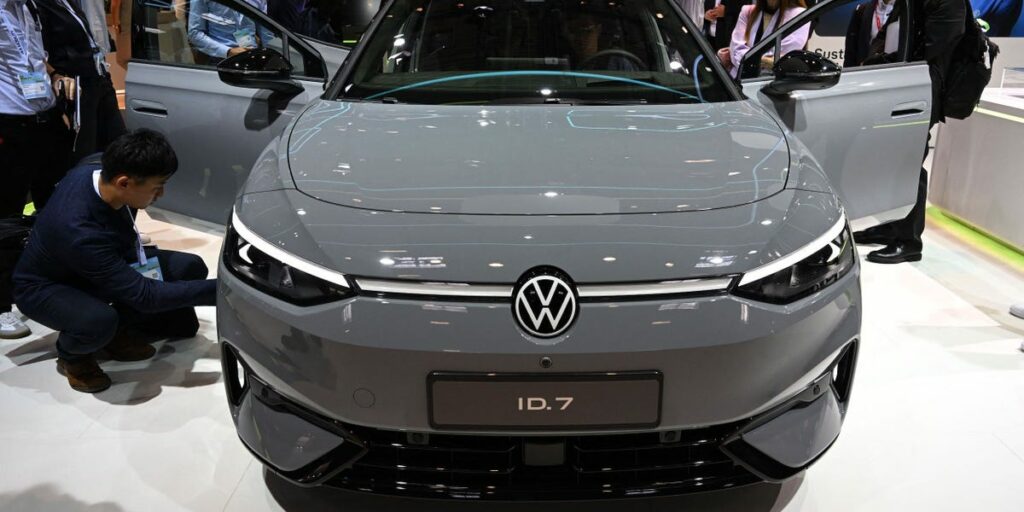Volkswagen is battling with sliding sales this year.
Hendrik Schmidt/dpa/Getty Images
Fight for survival in China
All three giants face a similar problem: they’re no longer selling enough cars in China, the world’s largest car market and a one-time cash cow for European automakers. About 21.7 million new vehicles were sold in China last year, per the China Passenger Car Association figures, compared with about 15.6 million in the US and 10.5 million in Europe.
Related stories
Like VW, BMW and Mercedes also reported a slide in sales in China in the third quarter, amid waning demand for luxury vehicles and the growing dominance of Chinese EV makers.
German carmakers are losing out to Chinese EV makers such as BYD.
Daniel Pier/NurPhoto via Getty Images
Helena Wisbert, professor of automotive economics at Ostfalia University in Germany, told Business Insider: “BMW and Mercedes are selling fewer cars, because the new players in the market for EVs have become really competitive, especially in China.”
Wisbert said that German manufacturers have failed to anticipate the changing behavior of Chinese consumers and diversify their product lines. She added that Mercedes, BMW, and Volkswagen offer comparatively few hybrid and extended-range vehicles — categories that have proven extremely popular in China.
European carmakers are under intense pressure from Chinese rivals such as BYD, Nio, and Xiaomi, which offer luxurious EVs vehicles with better software experiences — and all at far lower prices.
Xiaomi is best known for smartphones, but launched its first EV earlier this year.
Costfoto/NurPhoto via Getty Images
To make matters worse, some Chinese automakers are now eyeing expansion in Europe, even with the European Union planning tariffs on BYD and its rivals.
Wisbert said the brand strength of BMW and Mercedes in Europe gave them a crucial advantage over Chinese interlopers — but added that VW would likely face competition from Chinese brands that can build and sell EVs far more cheaply. “In the long run, it’s a big threat, especially for Volkswagen.”
Slow sales in Europe
At the same time, Germany’s automakers are also dealing with a slowdown in EV sales in Europe.
Mercedes said last week that sales of battery-powered cars fell 31% in the third quarter compared with the same period last year, while deliveries of Volkswagen Group EVs in Europe were down 12% in Q3.
Demand for electric vehicles has slowed in Europe amid a lack of affordable options and the end of subsidy schemes in some countries, including Germany, where new EV deliveries plunged by 69% in August.
“The European market has failed to return to health as quickly as hoped post-Covid,” Matthias Schmidt, an independent auto analyst based in Germany, told BI in an email.
“That is causing an over-capacity and under-utilisation problem leading to the need for restructuring across European operations, alongside new market entrants such as Chinese carmakers and Tesla increasingly eating up market share.”
Union workers rally outside a Volkswagen plant in Germany, where it’s a major employer.
JENS SCHLUETER/AFP via Getty Images
Wisbert said that despite Volkswagen and BMW starting to sell battery-electric vehicles more than a decade ago, German companies failed to make EVs their “focus” and are now losing out to rivals such as Tesla and BYD that can build and sell electric cars more cheaply.
“They missed the chance to get the cost for the battery under control. That’s the problem because their competitors can sell cars at a really low price level because they have the battery cost under control,” Wisbert said.
She warned that attempting to save money by scaling back EV plans would render German carmakers even less competitive in the future. Volkswagen and Mercedes have both adjusted their EV strategies and pushed back targets in recent months as sales stagnate.
“Right now they’re cutting their plans for future investment — and that’s not the best way to stay competitive in the future,” said Wisbert.
Investors are also sounding the alarm, sending Mercedes-Benz shares down more than 11% this year, with BMW sliding 28%.
VW, meanwhile, is down about a fifth this year, and close to half the stock price of October 2019. Analysts at UBS have a “sell” recommendation on the stock, and the potential cost and disruption that could be sparked by a “major restructuring.”
Mercedes, and BMW did not respond to requests for comment from BI.
Source link : https://www.businessinsider.com/germany-auto-giants-volkswagen-bmw-mercedes-struggle-sales-china-evs-2024-10
Author :
Publish date : 2024-10-30 10:57:00
Copyright for syndicated content belongs to the linked Source.
